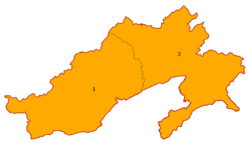2019 Indian general election in Arunachal Pradesh
The 2019 Indian general election are due to be held in India on 11 April 2019 to constitute the 17th Lok Sabha.[1]
| |||||||||||||||||||||||||
2 seats | |||||||||||||||||||||||||
|---|---|---|---|---|---|---|---|---|---|---|---|---|---|---|---|---|---|---|---|---|---|---|---|---|---|
| Turnout | 82.11% ( | ||||||||||||||||||||||||
| |||||||||||||||||||||||||
 | |||||||||||||||||||||||||
Candidates
Major election candidates are:[2]
| No | Constituency | Candidates | |
|---|---|---|---|
| BJP | INC | ||
| 1 | Arunachal West | Kiren Rijiju | Nabam Tuki |
| 2 | Arunachal East | Tapir Gao | James Lowangcha Wanglet |
Results
| No | Constituency | Turnout[3] | Candidate | Party |
|---|---|---|---|---|
| 1 | Arunachal West | 78.50 |
Kiren Rijiju | BJP |
| 2 | Arunachal east | 87.03 |
Tapir Gao | BJP |
Assembly segments wise lead of Parties
| Party | Assembly segments | Position in Assembly (as of 2019 simultaneous elections) | |
|---|---|---|---|
| Bharatiya Janata Party | 55 | 41 | |
| Janata Dal (United) | - | 7 | |
| Indian National Congress | 4 | 4 | |
| Janata Dal (Secular) | 1 | 0 | |
| National People's Party | - | 5 | |
| People's Party of Arunachal | - | 1 | |
| Independent | - | 2 | |
| Total | 60 | ||
gollark: Or Great Information Transfer.
gollark: Git stands for GIT Is Tremendous.
gollark: The stages of git clone are: Receive a "pack" file of all the objects in the repo database Create an index file for the received pack Check out the head revision (for a non-bare repo, obviously)"Resolving deltas" is the message shown for the second stage, indexing the pack file ("git index-pack").Pack files do not have the actual object IDs in them, only the object content. So to determine what the object IDs are, git has to do a decompress+SHA1 of each object in the pack to produce the object ID, which is then written into the index file.An object in a pack file may be stored as a delta i.e. a sequence of changes to make to some other object. In this case, git needs to retrieve the base object, apply the commands and SHA1 the result. The base object itself might have to be derived by applying a sequence of delta commands. (Even though in the case of a clone, the base object will have been encountered already, there is a limit to how many manufactured objects are cached in memory).In summary, the "resolving deltas" stage involves decompressing and checksumming the entire repo database, which not surprisingly takes quite a long time. Presumably decompressing and calculating SHA1s actually takes more time than applying the delta commands.In the case of a subsequent fetch, the received pack file may contain references (as delta object bases) to other objects that the receiving git is expected to already have. In this case, the receiving git actually rewrites the received pack file to include any such referenced objects, so that any stored pack file is self-sufficient. This might be where the message "resolving deltas" originated.
gollark: UPDATE: this is wrong.
gollark: > Git uses delta encoding to store some of the objects in packfiles. However, you don't want to have to play back every single change ever on a given file in order to get the current version, so Git also has occasional snapshots of the file contents stored as well. "Resolving deltas" is the step that deals with making sure all of that stays consistent.
References
- Singh, Vijaita (1 September 2018). "General election will be held in 2019 as per schedule, says Rajnath Singh". The Hindu. ISSN 0971-751X. Retrieved 4 January 2019.
- "Lok Sabha elections: BJP list of candidates for 2019". Indian Express. 26 March 2019. Retrieved 28 March 2019.
- Final voter turnout of Phase 1 and Phase 2 of the Lok Sabha Elections 2019, The Election Commission of India (20 April 2019, updated 4 May 2019)
This article is issued from Wikipedia. The text is licensed under Creative Commons - Attribution - Sharealike. Additional terms may apply for the media files.
